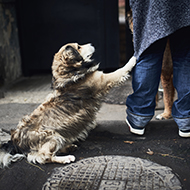
Officials in Hungary, Poland and Romania make exemptions for unvaccinated pets.
Romania, Poland and Hungary have relaxed their pet travel requirements, enabling animals from Ukraine to enter without a microchip, tattoo or vaccinations.
Hundreds of thousands of people have fled Ukraine since Russian troops invaded the country on Thursday, with many faced with the heartbreaking decision of whether to leave their animals behind. Some, however, have decided to travel with their beloved companions.
Images circulating on social media show Ukrainian citizens carrying dogs on their backs, perching cat carriers on their suitcases, and cradling pet rabbits in their arms. In another poignant image, a man hauls an assault rifle over one arm and carries a small tank of exotic fish in the other.
According to the People for the Ethical Treatment of Animals (PETA), Romania has introduced an exception to its pet travel requirements, enabling animals from Ukraine to enter the country with their human carers, even if they are not vaccinated, microchipped or tattooed.
Those entering Romania with companion animals are urged to visit the “Sanitary Veterinary Point” located at the borders to fill out a form to enable them to pass into the country. PETA, however, states that the situation remains unclear, as it is receiving reports that people are not being allowed to cross the border with their pets.
Similar to Romania, the government of Poland is also allowing animal companions (cats and dogs) to enter the country without vaccinations, a microchip or tattoo, or a blood test. Individuals that can provide an address in Poland can take their companion animals directly to their destination.
If transiting through Poland to another EU country, guardians must leave the animals behind in quarantine at a shelter near the border for three weeks.
Hungary has also relaxed its pet travel requirements, meaning that animals can enter without a microchip, tattoo, proof of rabies vaccination or titre test, so long as the relevant paperwork has been completed.
A statement from Hungary’s National Food Chain Safety Office reads: “The war situation in Ukraine is expected to force a significant proportion of the population to leave the country in the coming period.
“The Hungarian veterinary authorities are prepared for the arrival of companion animals that do not comply with the current veterinary requirements (without a microchip, unvaccinated against Rabies, without a Rabies antibody titre test) and arrive with their owners. To ensure smooth entry, the Chief Veterinary Officer of Hungary has ordered the completion of a simplified registration form.
“Ukraine is classified as a "country of concern" for rabies zoonosis, which imposes strict conditions for the movement of companion animals. In view of the war situation and the expected large number of refugees, the Hungarian veterinary authority has decided to apply a general procedure which is more favourable than the individual authorisations which can be granted in exceptional cases.”
The statement continued: “Until further notice, a registration form to be filled in on entry can be considered as equivalent to the so-called prior authorisation application, which will allow for a smooth entry procedure, traceability of the animals and the possibility of subsequent action.
“In order to maintain Hungary's rabies-free status, dogs, cats and ferrets entered in accordance with the above will be under the official control of the regional veterinary authority.”



 The RCVS has announced a new version of its 1CPD mobile app, with enhanced features for veterinary surgeons and veterinary nurses to record their continuing professional development.
The RCVS has announced a new version of its 1CPD mobile app, with enhanced features for veterinary surgeons and veterinary nurses to record their continuing professional development.